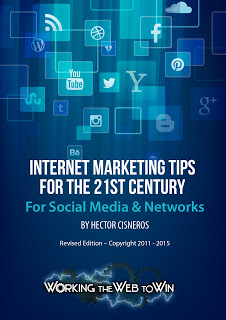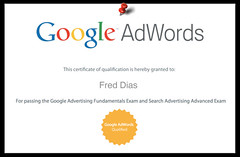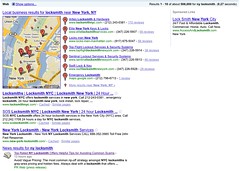Have you ever entered a
conversation about marketing and became instantly perplexed by the terminology
being bantered around? Did you get confused trying to follow the how, what,
when, and where in the marketing plan? At the end of the conversation, did it
seem like an epic tale spoken in Greek? If this is where you are with regards
to internet marketing then this article is for you. This article is part of a
series that is designed to cover basic terminology and actionable elements, as
well as give specific steps for developing your own marketing plan.
Part I: The Basis of
Search Engine Marketing and Social Media
| Spark Creative - Basic Computer Courses (Photo credit: Spark Creative Ltd) |
Marketing can be rendered in two ways. To start off, marketing can be
implemented as a one-off advertising event or as a campaign. As a general rule, campaigns are longer term
commitments that need to be planned out. By nature, campaigns in general
produce far better results than one-off advertising purchases.
Campaigns are broken into two types: Strategic and Tactical
Strategic refers to all the long term aspects of your overall
campaign goals. They should align with your company’s unique selling
propositions (USP), your mission statement and the principles your company
follows. Tactical refers to shorter
term goals, along with specific elements used as part of a daily, weekly,
monthly or quarterly campaign.
| Strategic and tactical limits of battle (Photo credit: Wikipedia) |
Annual agreement should always be
part of a cohesive strategic campaign. Examples of these types of programs would
be a Social Media Development campaign, (i.e., growth to approximately 1,200 fans) or Search
Engine page Ranking campaign, (i.e., reach a page one position). These two items
generally take some time to achieve. Trying to engage in this type of marketing
as a short term proposition usually doesn’t work.
From a digital marketing perspective,
organic efforts are usually set up as part of a long term campaign. For the most
part your individual elements will be set up on a monthly, quarterly, semiannual,
or annual basis, but the contracts themselves are usually annual. This is due to
the fact that reaching long term goals usually take longer to achieve. An exception
to this is pay per click which usually runs until your money runs out. We will talk
more about this later.
Some of the marketing elements you
chose may not seem to change much. For example: Social network development or Organic
Search Engine marketing efforts are usually annual contracts. You would normally
pay a monthly fee to a company that is providing some guaranteed growth or rank
position, not running ads. However, if the companies you contract with are worth
their salt, they will constantly change what they are doing in order to meet the
growth targets or reach your page rank goals. Contrast this to individual pay per
click ads running on Google or Facebook and you will notice you are managing (or
having someone manage) specific tactical ads that are usually geared to taking advantage
of event driven circumstances (seasonal or other promotion etc…). Pay per click
ads usually have a shorter in duration play, have a finite run and a finite budget
that may or may not last a year.
The Promise of Pay Per Click
| Certificado Renovado do Google Adwords para a 7 Pontos (Photo credit: 7Pontos.) |
In many contracts some services charge
for each view whether a person clicks on the ad or not, (a.k.a. pay per view). Generally you are charged
per thousand views/exposures. In most cases PPC is better than PPV because you only
pay for an actionable event. A click through to your site.
Search Engines vs. Social Media
Before we get too far into PPC, let's
define Search Engines and Social Media a bit more. Search mediums
fall into two categories, Search Engines and Directory Listings. The primary search
engines are Google (which has 81% of all search traffic), Yahoo, Bing and a few
others. Secondary Search mediums include directories like Merchant Circle, City
Search, Search Local and thousands of others. Today the line is becoming a little
blurred as Social Networks have gotten so big that they also provide search services.
Facebook has 900 million subscribers. Twitter, LinkedIn, YouTube and Google+ exceed
a billion subscribers.
All social networks provide some form
of search function and the top five also provide PPC, PPV and sponsored ads. A search
on a Social net is different from a Search Engine search in that it’s targeting
is based on a subscriber profile (which can include geographic, demographic and
psycho graphic information listed in a person's profile) as opposed to keywords.
Social Networks Defined
Now let’s define social media or more precisely, social networks. A social network is a free
subscription service that individuals and businesses join for their own reasons.
Many individuals join to connect with family, friends and coworkers. Others have
joined because it’s the new “in” thing to do. Many businesses join because they
want to connect with prospects and clients to sell and support the products/services
they offer.
As a rule, people join social networks
for one of four reasons; to connect with others, find useful information, be entertained
or learn interesting facts. Another important rule to remember is that nobody joins
a social network to be sold to. Businesses on the other hand join because they want
to sell and connect with prospects and clients! They want to sell to the millions
of subscribers on these social net
s. But rest assured that if you try a direct sales
approach you will lose many of your fans.Selling on social nets is done by
word of mouth, testimonials, recommendations’ and a little bribery. Yes, you can
run PPC and story ads and yes people will buy from those ads, but that’s not their
primary reason for being there. If you ONLY run commercials, your fans will be turned
off and may block you. The best way to sell anything on a social network is to let
your happy customers become your raving fans. Let them tell your story and reward
them for promoting your products or services. In my article called the “six cardinal rules for success in social media marketing”,
I lay out six guiding principles worth following. If you're interested check it
out. It will provide some useful insight into an approach that works.
| Infographic on how Social Media are being used, and how everything is changed by them. (Photo credit: Wikipedia) |
Is Organic Better Than Paid?
Another term related to Search Engine
and Social Media Marketing is the term Organic. Organic in search engine marketing
refers to a company’s listing position that was reached based on that search engines
criteria, (verses a paid position). For example; Google’s primary determining factor
for organic position is being “Relevant, Current, and Useful.” Relevant means how
well your content matched the keywords being searched. Current means it is timely and fresh. And content refers to information that is useful
to the user. Ads are not very important item on the list!
Organic, when used in a Social Media circles, usually referrals to natural
growth of your connections (followers, fans and friends etc.). Natural growth means
you did not buy or bribe the follower/fan by giving them gifts or holding contests.
However, the most important aspect
of your social network growth is not whether it was achieved by organic means or
by bribing them to follow with gifts. The most important factor is how loyal they
are to you and your brand. As a rule, fans who follow you naturally are more
loyal than those who were cajoloed. But
the difference in loyalty long term is based more on what you do with these fans
once they are connected to you.
| Press Release SEO Example (Photo credit: w2scott) |
The last marketing element I want to discuss in
this article is audience size. Market size is very important. The primary reason
that TV, Radio, Newspaper and the Yellow pages dominated most of marketing for so
many years is that they had the largest market share.
Today, traditional advertising mediums
are all losing market share rapidly. The average person is moving into the digital
age where TV, Radio, News Print and Yellow Pages are being transformed into their
digital replacements. Google is the new Yellow Pages, YouTube, NetFlix, Hulu and
others are becoming internet TV. Many online
newspapers and periodical subscriptions exceed their paper counterparts in size.
Traditional advertising media were measured in cost per thousands and the maximum
number for reach was in the millions. The Internet’s primary means of measurement
is still cost per thousand but the reach is potentially billions!
This transformation is taking place
because the internet is ultimately so much more personalized, convenient and user-centric than traditional media ever was. As a medium for content the internet offers
more choices, allows the individual to engage on their timeline and it gives them
the ability to truly interact and communicate with the advertisers and their peers
directly. This is something that traditional content mediums like TV, Radio and
Print could never hope to match. On top of that, the digital world is truly global
whereas conventional media was, (and still is) almost always regional at best. This
new global reach also means that your market is now the whole world!
As a business owner, it’s important
to recognize the additional advantages that digital marketing provides over traditional
media. One of the biggest problems with traditional media was it only offered minimal
tracking capabilities. You could create a special tracking phone number or use a
tracking code on a coupon, but for the most part, it was much harder to attribute
specific sales to specific ads. Conversely, digital marketing can track specific
actions in many more ways. Clicks, views, requests, forwards, re-tweets, posts, comments,
calls and more can all be tracked directly to an individual online ad. More importantly,
prospects can be targeted geographically, demographically and psycho-graphically.
 |
| Get your Free eBook above. |
In this article, I explored many
digital marketing elements. I defined and compared strategic and om traditional
advertising to the age of online marketing. Future articles in this series will
explore the many aspects of online marketing. I hope you have enjoyed and learned
from this article. If you have a different perspective, comment or thought, share
them with us.
tactical perspectives. We defined, compared and explored the boundaries of Search Engines and Social Networks. We explored the difference between pay per click, and pay per view as it pertains to search engines and Social Media marketing. And last but not least we defined the importance of audience size and the transition fr
tactical perspectives. We defined, compared and explored the boundaries of Search Engines and Social Networks. We explored the difference between pay per click, and pay per view as it pertains to search engines and Social Media marketing. And last but not least we defined the importance of audience size and the transition fr
That’s my opinion, I look forward
to reading yours.
If you would like to find more articles like this type in your key phrase in the search box at the top left of this blog. If you found this article useful, share it with your friends, families, and co-works. If you have a comment related to this article, leave it in the comment sections below. If you would like a free copy of our book, "Internet Marketing Tips for the 21st Century", fill out the form on the upper right-hand sidebar.
Hector Cisneros is COO of Working the Web to Win, an award-winning online marketing company based in Jacksonville, FL. He is also co-host of Blog Talk Radio’s “Working the Web to Win,” which airs every Tuesday at 4 p.m. Eastern.
If you would like to find more articles like this type in your key phrase in the search box at the top left of this blog. If you found this article useful, share it with your friends, families, and co-works. If you have a comment related to this article, leave it in the comment sections below. If you would like a free copy of our book, "Internet Marketing Tips for the 21st Century", fill out the form on the upper right-hand sidebar.
Hector Cisneros is COO of Working the Web to Win, an award-winning online marketing company based in Jacksonville, FL. He is also co-host of Blog Talk Radio’s “Working the Web to Win,” which airs every Tuesday at 4 p.m. Eastern.







Wow! An online marketing expert who speaks in plain English. Whoda thunk it. A must read for anyone looking to get back in the game.
ReplyDeleteGood content as usual Hector. Social media is where Im trying to focus my marketing efforts. Thanks for the tips
ReplyDeleteWell done Hector. Understanding the difference in strategic and tactical marketing is a must...you've explained it well. Just as that understanding applies to the web...it also applies to the mobile world. As small business owners, our potential markets are getting larger and larger...which means we must have an effective strategy and a clear tactical approach to pursuing that larger--very mobile--audience.
ReplyDeleteWow, What an Outstanding post. I found this too much informatics. It is what I was seeking for. I would like to recommend you that please keep sharing such type of info.If possible, Thanks. socila marketing seo solutions
ReplyDeleteWow, What an Outstanding post. I found this too much informatics. It is what I was seeking for. I would like to recommend you that please keep sharing such type of info.If possible, Thanks. business management books pdf
ReplyDeleteExcellent article, professionally written and informative. Small business owners realize the advantages digital marketing provides.
ReplyDeleteEspecially, staying in touch through blogs, email, and social media.
Exploring the boundaries of search engine optimization for digital marketing articles is a fantastic way to improve your marketing.
Thanks for this great read about online marketing.